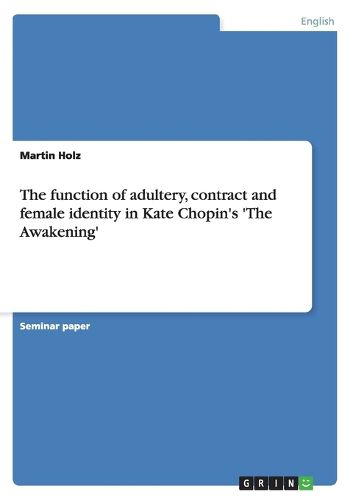Readings Newsletter
Become a Readings Member to make your shopping experience even easier.
Sign in or sign up for free!
You’re not far away from qualifying for FREE standard shipping within Australia
You’ve qualified for FREE standard shipping within Australia
The cart is loading…






Seminar paper from the year 1999 in the subject American Studies - Literature, grade: 1,0, University of Cologne, 24 entries in the bibliography, language: English, abstract: In Kate Chopin’s The Awakening, sexuality, love and marriage are negotiated in connection with the problem of a uniquely female identity which defies the ideas of Victorian prudery and seeks to represent the new woman . But what precisely is the nature of Edna’s awakening? Does the novel really convey a feminist tenor, and does Chopin succeed in exploring new cultural and social options in the sphere of fiction? Three major aspects have to be analysed to illuminate this matter, namely adultery, the notion of contract and the question of a female identity, all of which are directly linked to the organization and stability of society in general and in American society by the end of the nineteenth century in particular. Considering the ubiquity of adultery - seen as a transgression against the marriage contract - in nineteenth-century novels, Tony Tanner postulates relationships between a specific kind of sexual act, a specific kind of society, and a specific kind of narrative (1979: 12), all of which here imply a definition of woman’s role on a social scale. As far as The Awakening is concerned, however, the case is far from clear because society’s ideological hegemony is significantly diminished, though at no point relinquished. It is problematic to speak of Edna’s sexual liberation and emancipation for two reasons: firstly, there are no restrictive measures or even social sanctions like ostracism, and secondly, the ending is too ambivalent to interpret it from an exclusively feminist perspective. Nevertheless, Showalter is certainly correct in asserting that Chopin went boldly beyond the work of her precursors in writing about women’s longing for sexual and personal emancipation (1993: 170); contemporary reviews and the reception history as a whole supply sufficient evidence of thi
$9.00 standard shipping within Australia
FREE standard shipping within Australia for orders over $100.00
Express & International shipping calculated at checkout
Seminar paper from the year 1999 in the subject American Studies - Literature, grade: 1,0, University of Cologne, 24 entries in the bibliography, language: English, abstract: In Kate Chopin’s The Awakening, sexuality, love and marriage are negotiated in connection with the problem of a uniquely female identity which defies the ideas of Victorian prudery and seeks to represent the new woman . But what precisely is the nature of Edna’s awakening? Does the novel really convey a feminist tenor, and does Chopin succeed in exploring new cultural and social options in the sphere of fiction? Three major aspects have to be analysed to illuminate this matter, namely adultery, the notion of contract and the question of a female identity, all of which are directly linked to the organization and stability of society in general and in American society by the end of the nineteenth century in particular. Considering the ubiquity of adultery - seen as a transgression against the marriage contract - in nineteenth-century novels, Tony Tanner postulates relationships between a specific kind of sexual act, a specific kind of society, and a specific kind of narrative (1979: 12), all of which here imply a definition of woman’s role on a social scale. As far as The Awakening is concerned, however, the case is far from clear because society’s ideological hegemony is significantly diminished, though at no point relinquished. It is problematic to speak of Edna’s sexual liberation and emancipation for two reasons: firstly, there are no restrictive measures or even social sanctions like ostracism, and secondly, the ending is too ambivalent to interpret it from an exclusively feminist perspective. Nevertheless, Showalter is certainly correct in asserting that Chopin went boldly beyond the work of her precursors in writing about women’s longing for sexual and personal emancipation (1993: 170); contemporary reviews and the reception history as a whole supply sufficient evidence of thi